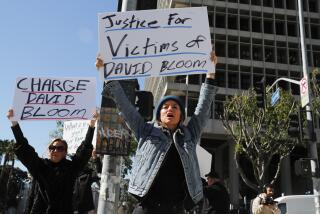Critiquing the Critics of Harold Bloom
- Share via
Adriana Craciun (letter, Sept. 23) complains that Harold Bloom “writes with nostalgia” for pre-feminist days when Wordsworth and Coleridge were revered and women writers kept in their places. Anyone who has read Bloom at all knows that this judgment is worse than unwarranted. Bloom places Jane Austen, Emily Bronte, George Eliot, Emily Dickinson, Virginia Woolf and Flannery O’Connor at the top of his literary pantheon in “The Western Canon” (1994), in “How to Read and Why” (2000) and in “Genius” (2002). No, he does not regret the passing of an all-male literary universe but rather one in which writers, male and female alike, were revered for their literary merit, not for their political cachet.
Several other letters on Bloom’s critique of Stephen King complain of his snootiness. But again, anyone familiar with the critic knows that he admits a taste for Jerry Falwell in “The American Religion” (1992) and no end of other lowbrow figures in our culture. Bloom doesn’t dismiss King outright; he merely bemoans the horrormeister’s being selected for the National Book Award, which is not granted for “entertainment” alone but also, ostensibly anyway, for literary merit.
As far as I know, King, J.K. Rowling and Danielle Steele have never pretended to such merit. Rightly so.
Timothy L. Pagaard
El Cajon
More to Read
Sign up for our Book Club newsletter
Get the latest news, events and more from the Los Angeles Times Book Club, and help us get L.A. reading and talking.
You may occasionally receive promotional content from the Los Angeles Times.










